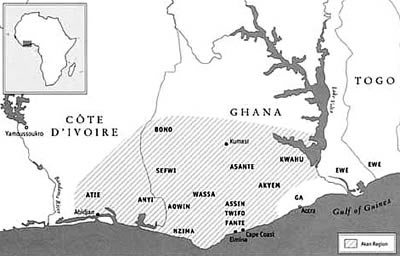I would like to introduce a new series to The Root that highlights connections between Africa and its diaspora in the so called New World. I will try to focus on connections between specific ethnic groups in Africa as we know that most of the nations of present day Africa have European made borders. I may repeat countries/ethnic groups as different ethnic groups were brought to the various colonies in the Americas.
As many of yall know while white supremacy and colonialism aimed to complete destroy the culture of captive African slaves, African culture survived in many ways. The second iteration of this series will focus on the Akan/Jamaica connection. Please feel free to contribute/correct/educate.
shout outs to @MansaMusa @KidStranglehold @CashmereEsquire @Nemesis @Poitier @IllmaticDelta @305DeadCounty @Luken
-------------------------------------------


Next up is Jamaica and it's connection to the Akan culture of Ghana/Cote D'Ivoire. Much research has been done on the influence of the Akan (known as Coromantee in Jamaica) on Jamaican culture.
A quote:
According to several studies, the majority of Jamaicans share genetic affinities /ancestry from the Akan.

What is most interesting about this is that according to present records, most slaves taken to Jamaica were from the Bight of Biafra and Central Africa


The question is, considering that more slaves were taken from Biafra and Central Africa, shouldnt Igbo and Kongo culture/ancestry be more apparent?
Many state that this is because Akan speakers were initially the largest group being brought to Jamaica, and thus Akan people brought later to Jamaica found it easier to assimilate/survive once taken to Jamaica. Due to the harsh conditions for slaves in Jamaica, most slaves in Jamaica were born in Africa, however African born slaves were less likely to survive then Jamaican born slaves (which were more likely to be descended of Akan).
See quote below:

For more: Jamaican maternal lineages trace back mostly to Ghana?
Coromantee - Wikipedia
Next post:Jamaican Patois
As many of yall know while white supremacy and colonialism aimed to complete destroy the culture of captive African slaves, African culture survived in many ways. The second iteration of this series will focus on the Akan/Jamaica connection. Please feel free to contribute/correct/educate.
shout outs to @MansaMusa @KidStranglehold @CashmereEsquire @Nemesis @Poitier @IllmaticDelta @305DeadCounty @Luken
-------------------------------------------


Next up is Jamaica and it's connection to the Akan culture of Ghana/Cote D'Ivoire. Much research has been done on the influence of the Akan (known as Coromantee in Jamaica) on Jamaican culture.
A quote:
[Jamaica had] the largest concentration of Gold Coast peoples anywhere in the British Atlantic world.”
According to several studies, the majority of Jamaicans share genetic affinities /ancestry from the Akan.

What is most interesting about this is that according to present records, most slaves taken to Jamaica were from the Bight of Biafra and Central Africa


The question is, considering that more slaves were taken from Biafra and Central Africa, shouldnt Igbo and Kongo culture/ancestry be more apparent?
Many state that this is because Akan speakers were initially the largest group being brought to Jamaica, and thus Akan people brought later to Jamaica found it easier to assimilate/survive once taken to Jamaica. Due to the harsh conditions for slaves in Jamaica, most slaves in Jamaica were born in Africa, however African born slaves were less likely to survive then Jamaican born slaves (which were more likely to be descended of Akan).
See quote below:
Interdisciplinary approach to the demography of Jamaica.....despite the historical evidence that an overwhelming majority of slaves were sent from the Bight of Biafra and West-central Africa near the end of the British slave trade, the mtDNA haplogroup profile of modern Jamaicans show a greater affinity with groups found in the present day Gold Coast region....this is because Africans arriving from the Gold Coast may have thus found the acclimatization and acculturation process less stressful because of cultural and linguistic commonalities, leading ultimately to a greater chance of survivorship and a greater number of progeny.
In addition, Many slaves initially brought to Jamaica were later resold to other colonies, particularly the Spanish colonies.The slave society on Jamaica also operated in a very rigid social hierarchy; creole slaves had much greater life expectancy, fecundity, and upward social mobility than those born in Africa. Slaves born of mixed parentage were more often the recipients of more favourable positions, including domestics and tradesmen. Slaves of colour were also much more likely to be manumitted by their owners [28]. Considering the estimated paternal contribution by Europeans for modern Jamaicans is estimated at just over 40% [10], African-European admixture may have played an important role in the legacy of the slave population.” (Deason et al., 2012, p.6)

For more: Jamaican maternal lineages trace back mostly to Ghana?
Coromantee - Wikipedia
Next post:Jamaican Patois
Last edited:









 Definitely
Definitely